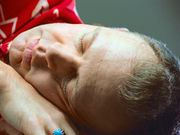But the research is preliminary and only included a small number of healthy young men
TUESDAY, Jan. 19, 2016 (HealthDay News) — Catch-up sleep may reverse the negative short-term impact of sleep loss on diabetes risk, at least in otherwise healthy fit young men, according to research published online Jan. 18 in Diabetes Care.
Initially, 19 healthy, young, and lean men were allowed up to 8.5 hours of sleep per night (between 11 p.m. and 7 a.m.) for four consecutive nights in a sleep lab. The same group was then placed on a lab-controlled sleep deprivation schedule. After that, the men were given two days of “recovery” sleep. They were allowed up to 12 hours of sleep on the first recovery day (from 10 p.m. to 10 a.m.) and up to 10 hours of sleep on the second recovery day (from 10 p.m. to 8 a.m.).
The researchers found that the men had a 23 percent drop in insulin sensitivity compared to normal levels after four days of too little sleep. Similarly, the disposition index (insulin sensitivity × acute insulin response to glucose) also dropped by 16 percent following sleep restriction. But testing following the two days of recovery sleep showed that both insulin sensitivity levels and the disposition index fully rebounded after the catch-up sleep.
“Whether a pre-diabetic or overweight person would improve is really not known,” lead author Josiane Broussard, Ph.D., an assistant research professor with the Sleep and Chronobiology Laboratory at the University of Colorado in Boulder, told HealthDay. “And while I would hypothesize that women — who also have impairments when sleep-deprived — would also improve, there could be a difference in the degree of their improvement. So really this study raises many more questions than we answer.”
Full Text (subscription or payment may be required)
Copyright © 2016 HealthDay. All rights reserved.








